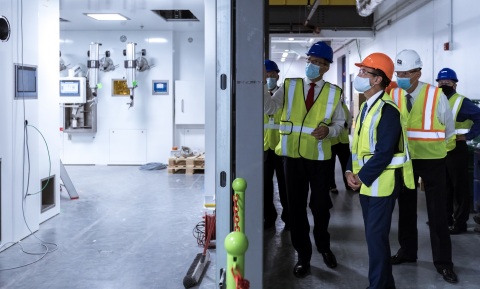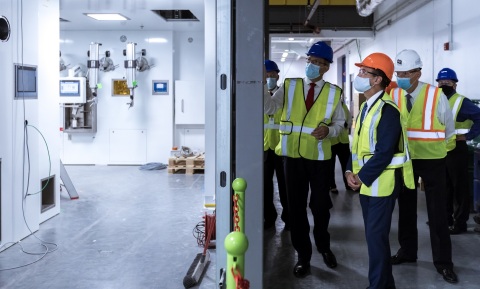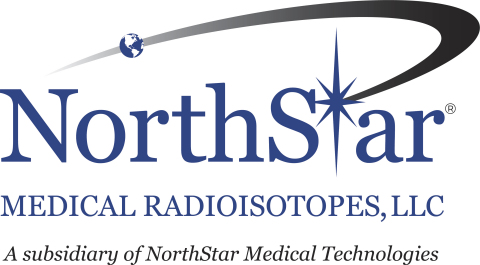BELOIT, Wis.--(BUSINESS WIRE)--NorthStar Medical Radioisotopes, LLC, a global innovator in the production and distribution of radioisotopes used for medical imaging, today announced that Deputy Secretary of Energy Mark W. Menezes visited the Company’s Beloit, Wis. headquarters on September 11, 2020. His travel to Wisconsin underscored the Department of Energy’s commitment to revive and expand the U.S. nuclear sector and to reduce dependence on foreign imports while bringing new opportunities to the heartland. During the trip, the Deputy Secretary toured two companies that are committed to or actively producing the important medical radioisotope molybdenum-99 (Mo-99). Mo-99 is the parent radioisotope of technetium-99m, the most widely used radioisotope in diagnostic imaging studies.
Highlights of Deputy Secretary Menezes’ visit to NorthStar included:
- Meeting with Executive Management;
- A tour of company Headquarters Facilities to learn about commercialized domestic production of Mo-99 and the RadioGenix® System (technetium 99m generator), including the QC microbiology lab, Production Assembly and Clean Room, Production Staging Area, Source Vessel Build and Recycling, Shipping and Logistics, Customer Care/Service/Training and LIFE Testing Areas; and
- A tour of construction progress on NorthStar’s Accelerator and Processing Facilities, which will house Mo-99 production accelerators and their associated beam-lines and target handling equipment, hot cells containing advanced radiochemistry and radiopharmaceutical processing equipment for Mo-99 production, a state of the art radiopharmaceutical testing laboratory and a first of its kind Molybdenum reclamation suite.
“This visit provided additional understanding about how the DOE/National Nuclear Security Administration’s Mo-99 program has been a positive influence in helping to resolve the U.S. healthcare system’s long-standing reliance on foreign sources of Mo-99,” said Mark W. Menezes, Deputy Secretary of the U.S. Department of Energy. “NorthStar, working with its partner, the University of Missouri Research Reactor (MURR®), and with support from the DOE/National Nuclear Security Administration, achieved the first domestic production of Mo-99 in almost 30 years. It is gratifying to see the progress that has been made, and the efforts that are underway to further expand U.S. radioisotope production and minimize reliance on overseas supply.”
“We were honored to welcome Deputy Secretary Menezes and the DOE to visit NorthStar Medical Radioisotopes,” said Steve Merrick, President and CEO of NorthStar Medical Radioisotopes. “NorthStar continues its active expansion to ensure continued growth in domestic Mo-99 supply by establishing dual production and processing hubs for additional capacity to better meet customer demand. Our product development programs, such as RadioGenix System 1.2, continue to help maximize operational utility and efficiency for radiopharmacies in producing Tc-99m, the medically useful isotope that is generated from Mo-99. The recent addition of FDA-approved filling lines at our Columbia, Mo. facility also substantially increased Mo-99 production efficiencies in filling Mo-99 source vessels.
Mr. Merrick continued, “Looking forward and pending FDA approval, NorthStar’s concentrated Mo-98 (cMo-98) will soon be available, enabling production of significantly increased volumes of Mo-99 and the provision of higher activity source vessels. This event will mark a major milestone for NorthStar and the nuclear medicine industry, helping to better meet customer demand for domestic Mo-99 beginning in January 2021. In addition, upon completion of equipment installation and qualification, appropriate licensure and FDA approval, the Isotope Processing facility in Beloit, Wis., will complement current processing capacity in Columbia, Mo. for Mo-99 source vessels. We expect initial FDA approval in 2022 for the Beloit facility. The Accelerator Production Facility construction in Beloit, which will enable additional volumes of Mo-99 production using “neutron knock-out” technology, continues on track, with the first pair of electron accelerators currently being assembled and tested at the manufacturer’s plant in Belgium. We expect shipment and installation of those accelerators in Beloit to occur in early 2021.”
About the RadioGenix® System (Technetium Tc 99m Generator)
The RadioGenix System is an innovative, high tech separation platform that is approved for processing non-uranium/non-highly enriched uranium molybdenum-99 (Mo-99) for the production of the important medical radioisotope, technetium-99m (Tc-99m). Prior to availability of RadioGenix technology, the U.S. supply chain for Mo-99 has been subject to frequent and sometimes severe interruptions which negatively impact patient healthcare. Approved by the U.S. Food and Drug Administration in 2018, the RadioGenix System is the first and only on-site, automated isotope separation system of its kind for use with non-uranium/non-highly enriched uranium based Mo-99, designed to help alleviate shortage situations and expand domestic supply.
Indication and Important Risk Information about the RadioGenix® System and Sodium Pertechnetate Tc 99m Injection USP
INDICATION
The RadioGenix® System is a technetium Tc-99m generator used to produce Sodium Pertechnetate Tc 99m Injection, USP. Sodium Pertechnetate Tc 99m Injection is a radioactive diagnostic agent and can be used in the preparation of FDA-approved diagnostic radiopharmaceuticals.
Sodium Pertechnetate Tc 99m Injection is also indicated in
- Adults for Salivary Gland Imaging and Nasolacrimal Drainage System Imaging (dacryoscintigraphy).
- Adults and pediatric patients for Thyroid Imaging and Vesicoureteral Imaging (direct isotopic cystography) for detection of vesicoureteral reflux.
IMPORTANT RISK INFORMATION
- Allergic reactions (skin rash, hives, or itching) including anaphylaxis have been reported following the administration of Sodium Pertechnetate Tc 99m Injection. Monitor all patients for hypersensitivity reactions.
- Radiation risks associated with the use of Sodium Pertechnetate Tc 99m Injection are greater in children than in adults and, in general, the younger the child, the greater the risk owing to greater absorbed radiation doses and longer life expectancy. These greater risks should be taken firmly into account in all benefit-risk assessments involving children. Long-term cumulative radiation exposure may be associated with an increased risk of cancer.
- Unintended Re-186 Exposure: Discard the first eluate from every new Potassium Molybdate Mo-99 Source Vessel to minimize the risk of unintended radiation exposure from Rhenium Re-186.
- Temporarily discontinue breastfeeding. A lactating woman should pump and discard breastmilk for 12 to 24 hours after Sodium Pertechnetate Tc 99m Injection administration.
- Sodium Pertechnetate Tc 99m Injection should be given to pregnant women only if the expected benefits to be gained clearly outweigh the potential hazards.
- Only use potassium molybdate Mo-99, processing reagents, saline and other supplies, including kit/packs, provided by NorthStar Medical Radioisotopes. Do not administer Sodium Pertechnetate Tc 99m Injection after the 0.15 microCi of Mo-99/mCi of Tc-99m limit has been reached or when the 12 hour expiration time from elution is reached, whichever occurs earlier.
To report SUSPECTED ADVERSE REACTIONS, contact NorthStar® Medical Radioisotopes, LLC at 1-844-438-6659; or FDA at 1-800-332-1088 or www.fda.gov/medwatch.
For RadioGenix® System version 1.1 Full Prescribing Information, click here or visit https://www.northstarnm.com/wp-content/uploads/2020/08/RadioGenix-System-v1.1-Package-Insert-rev-06-Aug-2020.pdf
For RadioGenix® System version 1.2 Full Prescribing Information, click here or visit https://www.northstarnm.com/wp-content/uploads/2020/07/RadioGenix-System-version-1.2-PI-Rev-02-July-2020.pdf.
About NorthStar Medical Radioisotopes, LLC (NorthStar)
NorthStar Medical Radioisotopes is a nuclear medicine technology company committed to providing the United States with reliable and environmentally friendly radioisotope supply solutions to meet the needs of patients and to advance clinical research. The Company’s first product is the RadioGenix® System (technetium Tc 99m generator), an innovative and flexible platform technology initially approved by the U.S. Food and Drug Administration in February 2018 for the processing of non-uranium/non-highly enriched uranium based molybdenum-99 (Mo-99), the parent isotope of technetium-99m (Tc-99m), which is currently the most widely used diagnostic radioisotope for medical purposes. NorthStar’s proprietary and patented technologies include non-uranium based molybdenum-99 domestic production methods, patented separation chemistry systems, patented sterilization systems and a technology platform that potentially allows expanded product offerings to provide solutions in both the diagnostic and therapeutic markets. Founded in 2006 and based in Beloit, Wis., NorthStar Medical Radioisotopes, LLC is a wholly-owned subsidiary of NorthStar Medical Technologies, LLC. For more information, visit: www.northstarnm.com.




